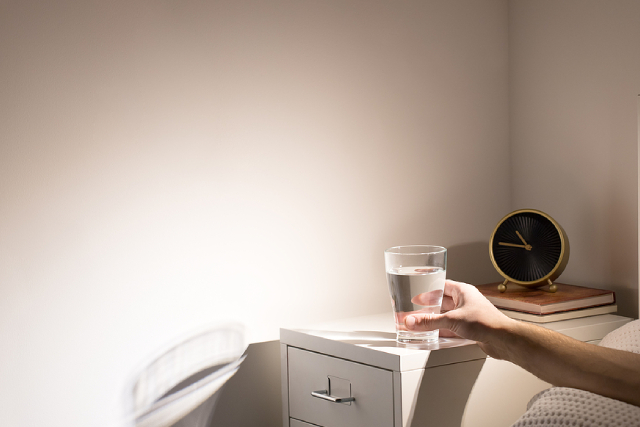
Have you ever climbed into bed, all snug and ready to drift off, only to realise your throat feels parched? The thought of waking up at 3 a.m., stumbling to the kitchen for water, isn’t exactly appealing. So, you sip some water before sleeping, hoping it keeps dehydration at bay. But is this a good habit? Does drinking water before bed benefit your health, or does it come with downsides?
It’s normal to feel the urge for a pre-sleep drink, especially if your day has been busy and hydrating wasn’t a priority. However, while hydrating is essential for overall health, the timing of when you drink water can impact your body in surprising ways – particularly when it comes to your sleep quality.
The benefits of drinking water before bed
Drinking water before bed can have some advantages, particularly if you’ve gone hours without a proper drink. Here are a few benefits:
1. Replenishing lost fluids
Your body loses water throughout the day through sweat, breathing, and other processes. Drinking water before bed can help replenish lost fluids, ensuring your body remains hydrated overnight.
2. Supporting detoxification
Hydration supports kidney function, helping your body filter toxins and maintain a healthy balance of fluids and electrolytes. A small glass of water before bed might aid this process as your body repairs itself during sleep.
3. Reducing morning dryness
If you often wake up with a dry mouth or throat, a bedtime sip could help prevent that discomfort, allowing you to start the day feeling fresher.
The downsides of late-night hydration
While there are benefits, drinking water before bed isn’t without its drawbacks. Here’s what to consider:
1. Interruptions to your sleep
One major downside of drinking water too close to bedtime is the potential for disrupted sleep. Waking up to use the bathroom interrupts your natural sleep cycle, making it harder to feel fully rested the next day. This condition, known as nocturia, becomes more common as you age or if you consume too much fluid late at night.
2. Risk of overhydration
Yes, overhydration is a thing! Drinking excessive water before bed can lead to frequent urination, which not only disturbs your sleep but could also dilute essential electrolytes in your body.
3. Impact on digestion
For some people, drinking water too late may lead to slight discomfort, such as bloating or an unsettled stomach, especially if they lie down immediately afterwards.
Striking the right balance
So, how can you stay hydrated without sacrificing your precious sleep? Here are a few tips:
- Monitor fluid intake throughout the day
Make hydration a priority during waking hours rather than trying to “catch up” before bedtime. Aim to drink water consistently throughout the day so you don’t feel compelled to gulp it down at night.
- Adjust timing and amount
Try having your last glass of water 1 to 2 hours before sleeping. This gives your body enough time to process the water and reduce the chances of nighttime disruptions.
- Listen to your body
If you genuinely feel thirsty before bed, a small sip of water is fine. However, avoid guzzling down large amounts if you want uninterrupted sleep.
Cold water or room temperature for hydration?
When choosing between cold water or room temperature for hydration, personal preference often dictates your choice. Some people find cold water refreshing, while others prefer room temperature for its gentler effect on the body.
What science says about drinking water at night
Interestingly, science has a few insights to offer. Hydration supports various bodily functions, such as maintaining energy levels, regulating body temperature, and aiding digestion. However, caution against excessive water consumption at night due to the risk of nocturia and disrupted circadian rhythms.
Hydration habits may also differ depending on lifestyle factors, such as diet, physical activity, and even your environment. If you’re using a water dispenser for your home in Singapore, you might find it easier to regulate your intake and have quick access to fresh, filtered water when needed.
Alternatives to consider
If you’re worried about hydration at night but don’t want to risk frequent bathroom trips, there are a few alternatives:
- Eat hydrating foods: Snacking on water-rich foods like cucumbers or watermelon earlier in the evening can help maintain hydration without overloading your system right before bed.
- Opt for smaller portions: Instead of a full glass of water, try taking small sips. This approach is less likely to disrupt your sleep.
- Set a hydration schedule: Having a routine for drinking water throughout the day can ensure you meet your hydration goals without needing to drink excessively at night.
Conclusion
Drinking water before bed can be both beneficial and disruptive, depending on your habits and needs. While it helps to hydrate your body, the timing and quantity of water intake matter to avoid sleep interruptions or other side effects. By managing your hydration throughout the day and making small adjustments to your routine, you can find the perfect balance.
Need to upgrade your hydration game? Watermaxx is your go-to for all things boilers, water dispensers, water coolers, and related products for both commercial and residential use.
